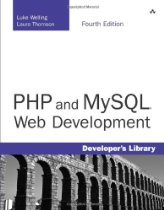

PHP and MySQL Web Development
PHP and MySQL are popular open-source technologies that are useful for quickly developing database driven Web applications and dynamic websites. PHP is a powerful scripting language designed to enable developers to create Web applications quickly, and MySQL is a fast, reliable database that integrates well with PHP and is suited for dynamic Internet-based applications.
PHP originally stood for personal home page. Though it is now said to stand for "PHP: Hypertext Preprocessor", a recursive acronym. It's development began in 1994 when the Danish/Greenlandic programmer Rasmus Lerdorf initially created a set of Perl scripts he called 'Personal Home Page Tools' to maintain his personal homepage, including tasks such as displaying his resume and recording how much traffic his web page was receiving.
PHP is a general purpose interpreted scripting language, developed to create dynamic web pages for websites. For this purpose, PHP code is either written as a stand alone PHP file or embedded into the HTML document's source and interpreted by a web server with a PHP processor module, which generates the web page document. PHP can be deployed on most web servers and as a standalone interpreter.
Professional PHP Web Development
PHP Web development is greatly enhanced by using complete a Integrated Development Environment (IDE) like Zend Studio.
PHP Security
PHP security has always been a major issue. Vulnerabilities are mostly caused by not following best practice programming rules. Recognizing that user input cannot always be trusted, some dynamic website programming languages, like ASP.NET, include taint checking to automatically detect the lack of input validation which is the source of many issues. Such a feature is being developed for PHP, but its inclusion in a release has been rejected several times in the past.
The National Vulnerability Database maintains a list of vulnerabilities found in computer software. Most of these PHP-related vulnerabilities can be exploited remotely. They allow attackers to steal or destroy data from data sources linked to the webserver (such as an MySQL database), send spam or contribute to DoS attacks using malware, which itself can be installed on the vulnerable servers.
PHP versus ASP.NET web development
Microsoft ASP.NET web applications are compiled which make them much faster than PHP, whose applications are interpreted. To achieve the same effect with PHP, Zend and PHP accelerator must be installed on the server, and this is rarely the case at most Web hosting companies.
The .NET class library is organized into inheritable classes based around particular tasks, such as working with databases, XML or user interfaces, so many of the more common tasks have been already implemented and well tested, which saves a lot of development time and helps to add to the overall reliabilty of website applications created in ASP.NET.
- ASP.NET provides greatly increased performance by running compiled code and caching application functions.
- ASP.NET has integrated security, supports form based user authentication, cookie management and automatic redirecting of unauthorized logins
- ASP.NET has better language support. ASP.NET supports any of the conforming .NET languages, including C#(C sharp), VB.NET and C++
- ASP.NET has a large new set of programmable controls
- XML based components
- ASP.NET supports event driven programming
- ASP.NET provides better scalability with greatly enhanced server to server communication, making it possible to scale an application over several servers
Please contact us to learn more about PHP web development for your website.
Sharing is caring:
WEBSITE-DEVELOPMENT
web development web services php